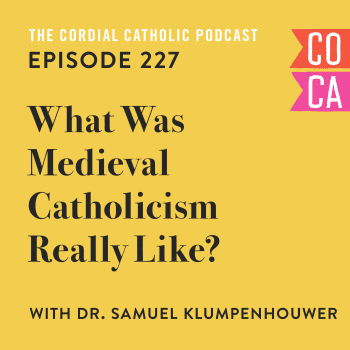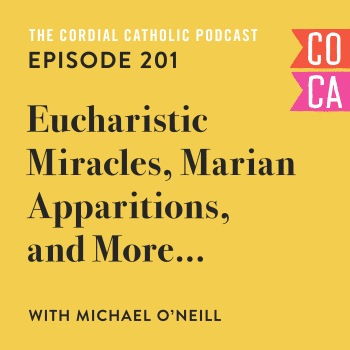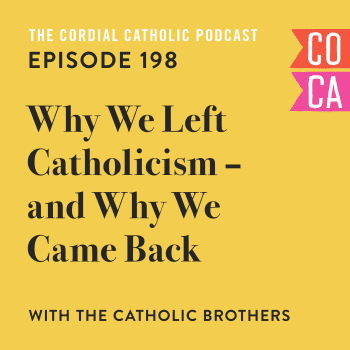
As an Evangelical Protestant, spontaneous, heartfelt prayer was the bread and butter of the expression of our faith. It was our lifeline; our direct means of communication with God. Our spontaneous, unrehearsed prayer was what moved God to our causes and concerns on earth.
So, as a convert to Catholicism I approached the Church’s vast litany of pre-selected and written prayers with an equal measure of incredulity and skepticism. Remarkably, however, after scratching below the surface, after taking a good look, I’ve come to the conclusion that it’s not the ancient and liturgical churches that have their prayers wrong, it was us evangelicals.
We’ve been praying wrong.
Rote is Routine; Routine is Religious; Religion is Bad
I come from a Pentecostal tradition that said, in no uncertain terms, that the Lord’s Prayer was vain repetition. I think it’s important to get that off my chest straight away because that’s where I, as a Christian, began.
Back in those early days, as a young and zealous Christian, we were taught to shun written and rote prayers as everything wrong with religious Christianity. Remarkably, the Lord’s Prayer, the prayer that Jesus taught us to pray was seen as something to fundamentally avoid. It was a template, we were told, a framework for how our own spontaneous, authentic prayers should sound and was never to be repeated verbatim.
What my Pentecostal upbringing taught me—and where we were perhaps were guilty of a bit of over-emphasis—was that rote, routine, and tired religious acts of all stripes should be avoided. That’s what they meant in the end with their strict avoidance of the Lord’s Prayer—a prayer which made up the cornerstone of the Christian Church for 2,000 years—they meant: we need to avoid falling into mindless pattern. And, really, that’s a laudable thing in the end.
What was, ultimately, wrong with written or memorized prayers was that they ran the risk of becoming dead—of becoming mere vain repetition. And this was something we, in my Pentecostal community, sought to avoid above all else.
Our Christian History of Prayer
Likewise missing from my Pentecostal upbringing, and from much of Evangelical Protestantism, in my experience, is a fundamental grasp of our history as Christians. For us Pentecostals, our history went back to the turn of the 20th century, or even more recently, to the foundation of our vibrant church community sometime in the 1960’s charismatic renewal.
We suffered, in the end, from a great amnesia about our past, about our collective history as Christians. We, sadly, couldn’t even trace our history back to the Reformation, let alone the beginning of the Christian Church and all the councils, heretics, and developments in between.
We forgot, as Thomas Howard writes,
“That the Faith has been borne on human shoulders and in human hearts for two thousand years.”
Naturally, with our ignorance of our shared Christian heritage we remained, largely, ignorant of the vast shared archive of written Christian prayer.
Likewise, our modern Pentecostal church, a descendant, ultimately, of the Congregationalist movement in North America, was a microcosm all of its own. We shared no history with the rest of Christianity, including a history of prayer. We, as many Evangelical communities do, drew a straight line from the Early Church communities, straight to ourselves. A hop, skip, and jump over all the mess in the middle.
What’s Wrong with Written Prayer
Fundamentally, if you’d asked me, as an evangelical, what was actually wrong with rote, written, or repeated prayers I probably wouldn’t have truly had a good answer. Probably, many in the same boat I was in, had a similar deficiency.
In my early upbringing we were truly leery of falling into vain repetition or merely ignorant, we left untouched the vast repository of Christian prayer opting, instead, for our own. But even in my experience of the more intentional, more traditional-leaning non-denominational church the practice of reciting prescribed prayers was completely absent.
We avoided such prayers out of ignorance and a vague sense of piety. Our spontaneous prayers were, at least on a subconscious level, more honest, more earnest, and more in tune with the heart of God. Nevermind that David—who was described by God as a man after His own heart—wrote the greatest collection of rote prayers the Church has even known.
And this,
“What I was forgetting was that the extempore prayers that I knew so well were themselves made up of stock phrases strung together.”
Thomas Howard, again, sheds light on our vague disdain for written prayers but reminding us that, ultimately, even our spontaneous prayers are made up of what he calls, lovingly, “stock phrases.” Expressions like “Dear God,” or “Lord, we come to You,” can be oft-repeated phrases which weasel their way into many a spontaneous prayer and have far less historical foundation and precedence than the ancient written, repeated prayers of the Christian Church.
While spontaneous prayer has, fundamentally, a place in all pious Christian devotion more room needs to be made, urgently, to access the vast treasure trove of written, ancient Christian prayer.
We’ve Been Praying Wrong
If our only good reason to avoid praying the written prayers of the Church is to avoid the appearance or reality of vain repetition then there are, undoubtedly, a number of other areas of our worship we need to likewise address.
Starting with worship music.
If anything but spontaneous prayer is shunned then what about rehearsed, repeated worship music—a cornerstone of our modern, evangelical worship. How is singing a rehearsed song any different than using a pre-selected, rehearsed prayer?
We must admit: There’s no difference at all.
But what about an argument made for relevance?
How can an ancient Christian prayer possibly be made relevant to our particular, unusual needs. What do ancient Christians like St. Athanasius, St. Ambrose, or St. Frances de Sales know of the very modern situations we find ourselves in—and the very modern problems we pray for?
While praying a spontaneous prayer for our friend’s social network might make us feel like we’ve truly reached God most earnestly mere feeling, I would argue, relates nothing to relevance.
Howard, again, writes poignantly,
“What is the touchstone of relevance: subjective sentiments or seventeen centuries of Christian worship.”
What remains relevant to us today? What is more relevant to the Christian act of worship? That which is spontaneous and makes us feel heard, or that which has remained historically relevant through the test of time? That which connects us with the Church across all time and space?
When Facebook has disappeared ten years from now the beautiful poetic prayers of St. Ambrose, you can bet, will still be repeated, and prayed, across the whole world.
Where We Go From Here
I feel a fool, as we all should, for needlessly spurning the beautiful, vast litany of Christian prayers. The two-thousand year treasure trove of faithful devotion. The vault of written prayer.
Whether for an outright fear of vain repetition of a vague misunderstanding and lack of Christian identity, we ignored, or shunned, written prayer at our own peril. We clung to spontaneous, personal and individual prayers because, we thought, they were more relevant, more genuine. But what could be more relevant, or more genuine, than prayer refined in fire for a thousand years?
Prayer that stood the test of a thousand plus years of Christian devotion.
Thomas Howard writes that,
“The prayers of the Church lead us into regions that, left to our own resources, we might never have imagined.”
The wealth of written Christian prayer takes us beyond our meager abilities to pray what we feel and gives us words, like the groaning of our spirit, to fill in the blanks. It brings us to new places, deeper places of relationship and connection—not places that are more shallow.
I write as a Catholic, an Evangelical Catholic, to my dearest, closest Evangelical friends. I write to say that, ultimately, we’ve been praying wrong.
Don’t get me wrong, we weren’t praying all wrong because God hears us, every weak whimper we make. Many older Catholics, I can tell you from experience, don’t know the first place to start a spontaneous prayer and that’s an awful deficit in and of itself. Spontaneous prayers are of vital importance to the devotional life of every single Christian. But fundamentally, our distrust or vague avoidance of written, ancient Christian prayer was, and is, misguided. There is a litany of beautiful, foundational prayers out there just waiting for us to begin to scratch at the surface.
And we need this.
We need, as evangelical communities of believers, to reconnect more fully with the tradition in which we stand. We need to learn our history so that we can learn from it, and grow, and we can begin by praying prayers that set us shoulder to shoulder with great Christians, martyrs, and heroes of the faith.












